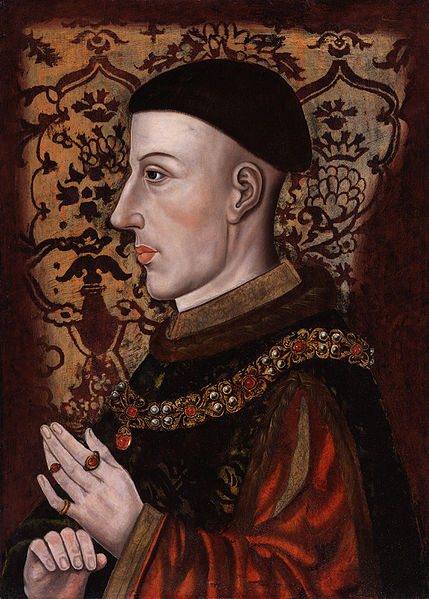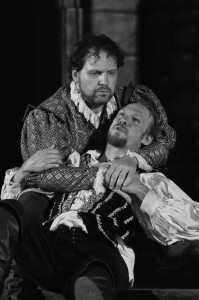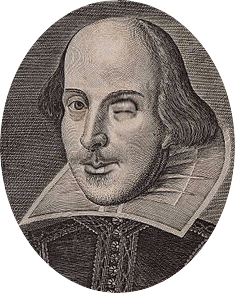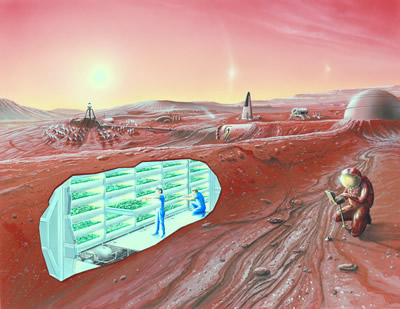Shakespeare and Metaphor
by Michelle Rasmussen
April 2012
 Michelle Rasmussen. |
The language of human creativity vs. deductive “Sudoku” thinking, or What quality must language posses, so that we may go to Mars?
The following article is based on a class given on March 24, 2012, at a recent Schiller Institute in Denmark youth seminar.
Prologue:
What is your own, but is most often used by others? (Think first, before looking down)[1]
What can you see as an image, but all others can see in reality?[2]
A long time ago, the winter was so cold that the Sound between Denmark and Sweden was frozen. It was the time of one of the many wars between Denmark and Sweden, and a Swedish general announced an offensive. The situation was so desperate that the soldiers were even told that they would receive 10 crowns for every prisoner taken.
 Wikimedia Commons.
William Shakespeare. |
The troops set off to cross the frozen Sound, and, when they arrived at the Danish coast, Gustav and Emil had gotten separated from the main force. They set up their tent and retired for the night.
In the morning, Gustav woke up, and looked out of the tent. There, completely surrounding the tent, were 1000 Danish soldiers in fighting position.
Gustav shouted, “Oh, my God!.”
He shook Emil, “Wake up! Wake up!”
”What is it?”
“We’re rich!”
***
Act I:
In science, we discover the physical principles which govern nature, which enables us to create totally new physical objects or processes.
In art, we discover the principles which govern how our own creative thinking process works, enabling us to consciously create new creativity.
Thus, artistic creativity comes first, because it holds a mirror up to our own mind.
Human beings actively intervene in the world, and, also, put themselves under a magnifying glass.
In order to express this creativity to others, our language requires special characteristics.
During the past couple of years, Lyndon LaRouche has concentrated on writing many articles on the subject of human creativity, because mastering the secrets of human creativity is the key to the future. Creativity is that which enables us to have a vision of the future, thus changing, and forming the present in its image.
Let us investigate two related concepts: the imagination, and metaphor.
Act II: Imagination
 Wikimedia Commons.
Albert Einstein |
Albert Einstein said:
“Imagination is more important than knowledge. For knowledge is limited to all we now know and understand, while imagination embraces the entire world, and all there ever will be to know and understand…. Logic will get you from A to B. Imagination will take you everywhere... It is the preview of life's coming attractions."
Think about a play. There is an interplay between the author, director, actors, and, also, the audience. There are also scenery and costumes.
Now, listen to the Prologue from Shakespeare’s drama, Henry V, where a single actor, Chorus, speaks directly to the audience, harking back to the effect of the chorus in ancient Greece. (See glossary below the Prologue)
 Wikimedia commons.
King Henry V. |
O for a Muse of fire, that would ascend
The brightest heaven of invention,
A kingdom for a stage, princes to act
And monarchs to behold the swelling scene!
Then should the warlike Harry, like himself,
Assume the port of Mars; and at his heels,
Leash'd in like hounds, should famine, sword and fire
Crouch for employment. But pardon, and gentles all,
The flat unraised spirits that have dared
On this unworthy scaffold to bring forth
So great an object: can this cockpit hold
The vasty fields of France? or may we cram
Within this wooden O the very casques
That did affright the air at Agincourt?
O, pardon! since a crooked figure may
Attest in little place a million;
And let us, ciphers to this great accompt,
On your imaginary forces work.
Suppose within the girdle of these walls
Are now confined two mighty monarchies,
Whose high upreared and abutting fronts
The perilous narrow ocean parts asunder:
Piece out our imperfections with your thoughts;
Into a thousand parts divide on man,
And make imaginary puissance;
Think when we talk of horses, that you see them
Printing their proud hoofs i' the receiving earth;
For 'tis your thoughts that now must deck our kings,
Carry them here and there; jumping o'er times,
Turning the accomplishment of many years
Into an hour-glass: for the which supply,
Admit me Chorus to this history;
Who prologue-like your humble patience pray,
Gently to hear, kindly to judge, our play.
Glossary:
Harry: King Henry V of England
port: bearing
Mars: the god of war
wooden O: round, wooden theater, like Shakespeare’s Globe Theater
Agincourt: famous battle near the French castle of Agincourt, where the inferior numbered British troops led by Henry V, defeated the French
casques: helmets;
crooked figure: zero, which is not straight, when added to “1” can make a million
ciphers: zeros/nothings;
puissance: power, potency
What is the main idea here?
The creative Shakespeare is speaking directly to you, to awaken your creativity, your imagination, your fantasy. In truth, that is the purpose of the play. To raise the level of the audience, so that they may become better to see into the future, or to create visions of the future, in order to change the present.
Now, see a video version of the Prologue here: http://youtu.be/B5dI65LvbrE
At the very end of Shakespeare’s most famous play, “The Tragedy of Hamlet, Prince of Denmark,” the bodies of the King, the Queen, and Hamlet, himself, are lying there, as the Norwegian prince and his forces enter to take over. Hamlet’s friend, Horatio, says that he must recount the tragedy,
 Shakespeare Festival St. Louis sfstl.com
Jason Cannon* as Horatio, holding Hamlet, played by Jim Butz*. *Denotes Member, Actors' Equity Association |
“Even while men's minds are wild; lest more mischance
On plots and errors, happen.” [3]
He will tell Hamlet’s story, because, as the adage says, “If we don’t learn from history, we are doomed to repeat it.”
Schiller stated in “Theater Considered as a Moral Institution,” that the purpose of a play is to educate the moral character of the audience, so that they may become able to rule themselves — the essence of a republic[4] . In tragedy, the audience is allowed to imagine the tragic future consequences of the character’s actions, or lack of action, at arms length, so they may learn from it.
Think about LaRouche’s economic forecasting. He has developed his imagination to look into the future, in the sense of projecting the future implications of the fatal flaws of the current culture, and comparing that with his vision of where civilization could be, for the purpose of changing how we act now.
In a different, but related sense, think about the imagination of a Leonardo, whose vision of the future was so advanced, that he could invent all kinds of machines, on paper, which could only be realized hundreds of years later, if at all.
Act III: Metaphor
LaRouche recently wrote that metaphor is the means by which the human mind is capable of recognizing itself.
Look at this short section of On Metaphor: an Intermezzo, an LPAC video about metaphor and Kepler. [5] (Or, perform the experiment yourself)
Think, also, about Plato’s allegory of the cave in The Republic. Imagine people born in a cave, and chained in such a way as they can only see the shadows of objects cast on the wall. What is the reality behind the shadows?
But, now, let’s take an example of a metaphor. The word comes from the Greek word metapherein, to transfer, meta+ pherein to bear or carry.
Here is a metaphor from Shakespeare’s Romeo and Juliet:
"O, she doth teach the torches to burn bright!
Her beauty hangs upon the cheek of night,
Like a rich jewel in an Ethiop's ear";
—Act I, scene v
What is Shakespeare trying to express? What is he asking you to compare or contrast? What is the unifying idea behind the diverse images, which causes it, as we say in Danish, “to go up into a higher unity” (at gå op i en højere enhed), like the cylinder behind the square and the circle? What in the world has Juliet to do with an Ethiopian?
How would you say that in a literal, non-metaphoric way? Think of the difference. What does the metaphor cause to happen in your mind, as opposed to the literal? In metaphor, your mind is challenged to actively solve a problem, and make a leap.
LaRouche explained,
“By ‘metaphor’ so identified, we should have understood as my intent to signify two or more distinct symbols which are not directly connected to one another in their apparent reality, but which function as if they were shadows cast by the conjunction of an unsensed single reality, in their effect. The naive observer sees this as a set composed of sets of presumably interacting "realities," as if an actual Birnam Forest had actually come to Dunsinane.” [6]
In short: “The implied simultaneity among a very special quality of several, indirectly related objects.” LaRouche also emphasized that metaphor is the “highest form of expression of the root of the process of human discovery.” [7]
Here is a series of metaphors from Shakespeare’s creative mind, as found in his plays: (Pick out those to discuss) [8]
"But, look, the morn, in russet mantle clad,
Walks o'er the dew of yon high eastern hill."
—Hamlet, i. 1.
(Russet: reddish-brown; mantle: a large coat, cloak)
"Look, love, what envious streaks
Do lace the severing clouds in yonder East:
Night's candles are burnt out, and jocund day
Stands tiptoe on the misty mountain tops."
—Rom. and Jul., iii. 5.
(lace: mark with colored streaks; jocund: high spirits and lively mirthfulness)
"The charm dissolves apace;
And as the morning steals upon the night,
Melting the darkness, so their rising senses
Begin to chase the ignorant fumes that mantle
Their clearer reason." ...
"Their understanding
Begins to swell; and the approaching tide
Will shortly fill the reasonable shore
That now lies foul and muddy."
—The Tempest, V, i
The gaudy, blabbing and remorseful day
Is crept into the bosom of the sea;
And now loud-howling wolves arouse the jades
That drag the tragic melancholy night;
Who, with their drowsy, slow and flagging wings,
Clip dead men's graves and from their misty jaws
Breathe foul contagious darkness in the air.
—Henry VI, Part 2, IV, I
To be, or not to be; that is the question:
Whether ‘tis nobler in the mind to suffer
The slings and arrows of outrageous fortune,
Or to take arms against a sea of troubles,
And, by opposing, end them. [9]
—Hamlet, 3.1.58
[Banquo to the wierd sisters:]
If you can look into the seeds of time,
And say which grain will grow and which will not,
Speak then to me . . .
—Macbeth 1.3.58
[Duncan to Macbeth:]
Welcome hither.
I have begun to plant thee, and will labor
To make thee full of growing.
Macbeth 1.4.27
[Lady Macbeth:]
"Come, thick night,
And pall thee in the dunnest smoke of Hell,
That my keen knife see not the wound it makes,
Nor Heaven peep through the blanket of the dark,
To cry Hold, hold!"
(dun: brown-grey)
[Macbeth:]
"Heaven's cherubin, hors'd
Upon the sightless couriers of the air,
Shall blow the horrid deed in every eye,
That tears shall drown the wind."
"The flame o' the taper
Bows toward her; and would under-peep her lids,
To see th' enclosèd lights, now canopied
Under these windows, white and azure, lac'd
With blue of heaven's own tinct."
Cymbaline
"My conscience, thou art fetter'd
More than my shanks and wrists: you good gods give me
The penitent instrument to pick that bolt,
Then free for ever!"
Cymbaline
"Some joy too fine,
Too subtle-potent, tun'd too sharp in sweetness,
For the capacity of my ruder powers."
Troilus and Cressida, Act III, Scene 2
“Time travels in divers paces with
divers persons . . . I’ll tell you who Time
ambles withal, who Time trots withal, who
Time gallops withal, and who he stands tall
withal.”
As You Like It 3.2.310

Picture credit: Mvh. Janus Kramer Møller, Wikimedia Commons
|
The Prologue from Henry V above, is also replete with metaphors, which you can look at again.
In addition to these, and many others from his plays, Shakespeare’s sonnets are metaphorical gems.
LaRouche has stressed that metaphorical thinking is not only the key to art, but, also, of science: “a metaphor is of the same nature, as to form, as the ontological paradox which obliges the thinker to discover a validatable new universal physical principle.”[10] Metaphor, through paradox and irony, overturns old assumptions, forces your mind to reconsider, and think about things in a new way.[11] The entire video On Metaphor: an Intermezzo is a wonderful presentation of the role of metaphor in scientific discovery, highlighting Kepler’s “vicarious hypothesis,” which LaRouche has called a prime example of scientific metaphor.
Metaphor is the language of human creativity. It unleashes a playful, surprising thinking process, which provokes you to think in a non-deductive way, “out of the box.” It is just this quality of thought needed to discover the new physical principles which will get us to Mars. The quest in science is not to discover what, but why. Metaphor trains us to search behind the shadows of sense certainty, to find the principles that cause physical phenomenon.
 Wikimedia Commons.
A human colony on Mars. |
Then, how do you communicate your new idea, which no one has ever thought of before? How do you provoke that “Eureka”-like creative thinking process in others, so that they may rediscover the idea themselves? How can you set up a conflict that can only be resolved by a new idea? Can you do that with language that is literal, deductive and flat? Or can it only be done through the use of metaphor — which forces the other to make a leap of thought, as in solving a riddle, or getting the point of a joke, or causing metaphorical counterpositions to “go up in a higher unity.”
What language is spoken in “that undiscover’d country” of unknown principles, where we may discover just those principles that will enable the human species to explore our solar system?
Or, what is the nature of nature, such that we need metaphor to describe it? Is it a static universe that may be described in literal thought and language, or an anti-entropic, constantly developing process, like a classical music masterpiece, provoked by creative conflict, paradox, and irony?
Let’s change the way we think — through metaphor. Let’s go back to the masters of metaphor, like Shakespeare — to read, recite and perform his masterworks — so that we may go forward to Mars. The End
Footnotes
[1] your name
[2] your own face
[3] an online version may be found at: http://shakespeare.mit.edu/hamlet/full.html
[4] http://www.schillerinstitute.org/transl/schil_theatremoral.html
[5] from 2:41 to 3:44 http://larouchepac.com/metaphor-intermezzo
[6] LaRouche, Lyndon, The Mystery of Your Time, http://larouchepac.com/node/21206
[7] LaRouche, Lyndon, The Strategic Situation Now http://larouchepac.com/node/20865
[8] mostly from, where there are others: Hudson, Henry Norman. Shakespeare: His Life, Art, and Characters, Volume I. New York: Ginn and Co., 1872. Shakespeare Online. 20 Aug. 2009. http://www.shakespeare-online.com/biography/metaphorlist. html
[9] The rest of the monologue:
To die: to sleep;
No more; and by a sleep to say we end
The heart-ache and the thousand natural shocks
That flesh is heir to, ‘tis a consummation
Devoutly to be wish’d. To die, to sleep;
To sleep: perchance to dream: ay, there’s the rub;
For in that sleep of death what dreams may come
When we have shuffled off this mortal coil,
Must give us pause: there’s the respect
That makes calamity of so long life;
For who would bear the whips and scorns of time,
The oppressor’s wrong, the proud man’s contumely,
The pangs of despised love, the law’s delay,
The insolence of office and the spurns
That patient merit of the unworthy takes,
When he himself might his quietus make
With a bare bodkin? who would fardels bear,
To grunt and sweat under a weary life,
But that the dread of something after death,
The undiscover’d country from whose bourn
No traveller returns, puzzles the will
And makes us rather bear those ills we have
Than fly to others that we know not of?
Thus conscience does make cowards of us all;
And thus the native hue of resolution
Is sicklied o’er with the pale cast of thought,
And enterprises of great pith and moment
With this regard their currents turn awry,
And lose the name of action.
—Hamlet, 3.1.58
[10] On the Subject of Education. http://www. larouchepub.com/lar/1999/2650_education.html
[11] ibid. “A legitimate ontological paradox, or metaphor, is one which confronts the hearer with evidence which overthrows the assumption which the hearer may be presumed to bring to the subject matter of the poem, or other artistic composition being presented. The proof that this apparent contradiction in terms, is a valid one, forces the mind of the hearer to reconsider that, his or her view of the subject-matter within which the opening of the discussion was situated.”
